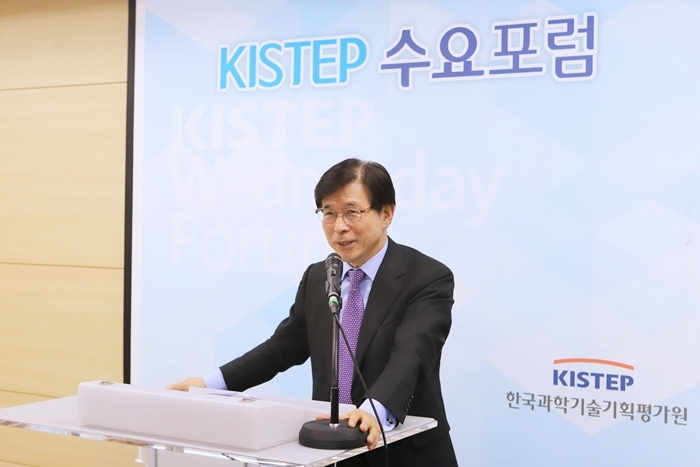News & Event


News & Event
News & Event
[The 101st KISTEP Wednesday Forum] The Examples and Policy Implications of Social Problem Solving Business Model
- Writer Kyungran Choi
- Date2019-03-27
- Hit1,023
File
-
Download
 20190327135342.jpg
(31.15KB / Download 228회)
20190327135342.jpg
(31.15KB / Download 228회)
KISTEP held the 101st Wednesday Forum with the theme of ‘The Examples and Policy Implications of Social Problem Solving Business Model (focusing on the Korean social venture investment ecosystem)’ on March 27th (Wed), 2019. As we are in the era of inclusive growth in pursuit of social values, the role of Science and Technology (S&T) is also expanding to resolve social problems and improve the quality of life along with economic growth. The forum was held to see various domestic social venture examples and investment environments, and discuss the direction of S&T policy to activate social problem solving business models.

[▲ Sang-seon Kim, (President, KISTEP)]
The forum began with an opening address by President Sang-seon Kim (KISTEP), followed by presentation by Jeong-Tai Kim(CEO, Merry Year Social Company (MYSC)). Panel discussion were led by Hyun Sub Kum (Professor, Graduate School of Public Administration, Seoul National University), Sung-ho Choi (Chairman, The Circle Foundation), Sung-hoon Park (Research Director, Center for Social Entrepreneurship Studies (CSES)) and Seung-Kyu Yi (Director, Center for Social Innovation Policy, KISTEP) and open floor discussion followed the last.
In the presentation, CEO Jeong-Tai Kim expressed, "Before we understand social problem solving businesses, we need to change our perception of social issues first. Social issues need to be recognized as a potential area of business opportunity, going beyond the existing perception that they are subject to donation-oriented social contributions. Major and social companies should work together with social ventures to create innovative business models that accept and resolve social and environmental values."
In the presentation, CEO Jeong-Tai Kim expressed, "Before we understand social problem solving businesses, we need to change our perception of social issues first. Social issues need to be recognized as a potential area of business opportunity, going beyond the existing perception that they are subject to donation-oriented social contributions. Major and social companies should work together with social ventures to create innovative business models that accept and resolve social and environmental values."

[▲ Jeong-Tai Kim(CEO, Merry Year Social Company (MYSC))]
CEO Kim introduced various types of business models for social ventures, defining social ventures as 'An enterprise that resolves social problems or sustainably realizes pursuit of social purpose through innovation and scaling of its business.' He explained that when major companies collaborate with social ventures, they gain the market and customer-related insights for business expansion, and by solving social and environmental problems through innovative business models, they can create both economic and social value at the same time.
Lastly, he explained about the implications of S&T policies in activating social ventures. He said, "Social issues have complexities that there should be a solution against it based on systemic thinking. Therefore, it is necessary to establish a value chain system for the solution by various experts in each field to solve specific social problems first, and then increase the sustainability, success and probability of mutual learning with intensive investments such as support for R&D costs," He emphasized the need for a strategy led by the private sector and supported by the government and said, "We need a 'Social Problem Solving' TIPS strategy in S&T."

[▲ (from the left) Hyun Sub Kum (Professor, Graduate School of Public Administration, Seoul National University), Sung-ho Choi (Chairman, The Circle Foundation), Sung-hoon Park (Research Director, Center for Social Entrepreneurship Studies (CSES)) and Seung-Kyu Yi (Director, Center for Social Innovation Policy, KISTEP)]
In the panel discussion, Professor Hyun Sub Kum emphasized the importance of collecting social venture investment, "For social venture investment to achieve sustainability, it is necessary to obtain the consent of the public by securing justification (creating visible effects)," and he said, "In fact, what social ventures do can overlap with the categories that have been done by existing non-profit organizations such as NGOs and NPOs. In order for a social venture to be sustainable, it needs to have a differentiated business model."
Chairman Sung-ho Choi suggested that the R&D planning and diffusion platform for solving consumer-oriented social problems should be prepared by benchmarking success cases in advanced countries such as the U.S. where the government invites the public participation to propose proposals for development goals and compensates for the costs of achieving the goals.
Research director Seong-hoon Park explained the difficulty in finding practical business links between major companies and social ventures, and said, "By preparing a system that measures social values, we should be able to demonstrate the effects that social ventures create in conjunction with large companies through quantitative evaluations." It also stressed that "the areas that traditional social enterprises have dealt with and the areas of technology-based social ventures are not much different," but "there is a need to build an agreement body that can mediate the conflicts with existing social enterprises."
"To come up with solutions to social problems, lots of effort is needed not only in R&D, but also in non-R&D (finance, etc.) areas. As the expectations of the public are rising for the role of S&T in solving social problems, S&T may have to be the center of consensus in coming up with solutions." Director Seung-Kyu Yi said.